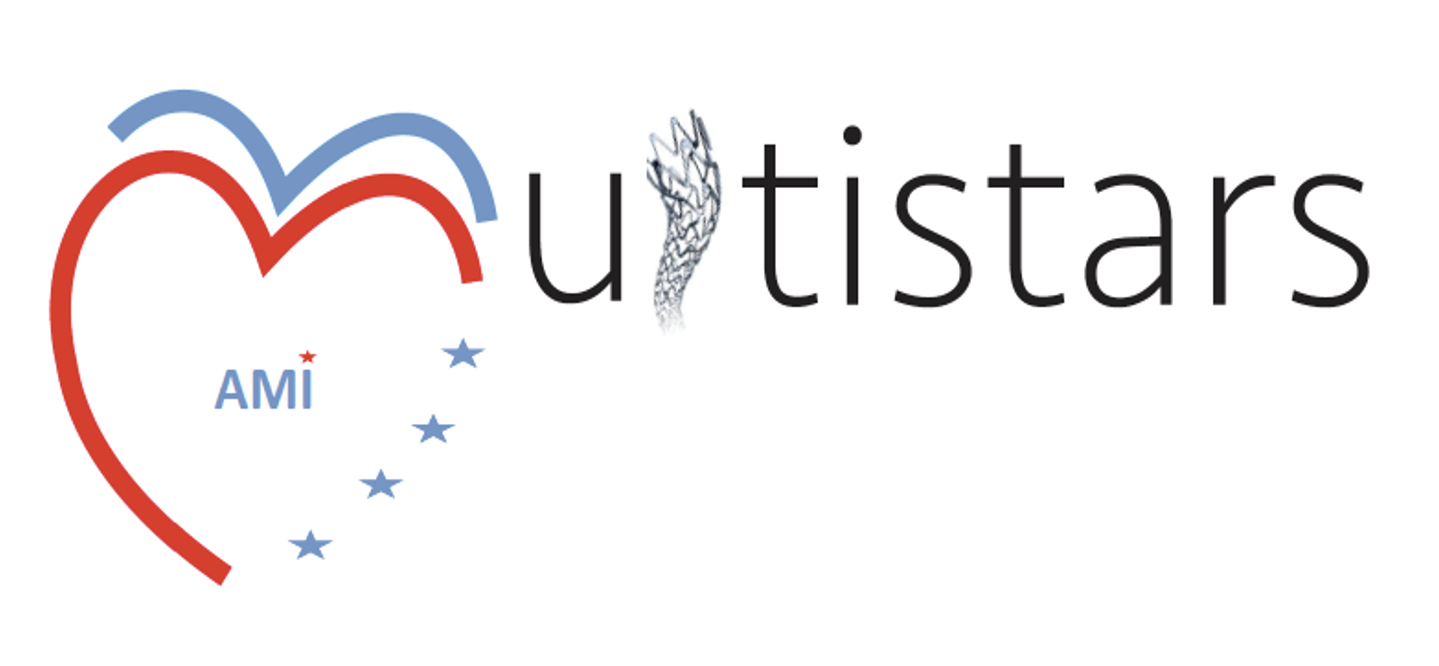Andreas Grüntzig Clinical Research Center
What was previously considered impossible, the young physician and researcher Dr. Andreas R. Grüntzig achieved for the first time on September 16, 1977 at the University Hospital Zurich. He dilated the constricted coronary arteries of Dölf Bachmann, a patient at risk of a heart attack, using a balloon catheter (PTCA) he had developed. The Andreas Grüntzig Clinical Research Center (AGCRC) was founded in his honor.
Overview of our studies
The MULTISTARS AMI study was initiated by the Department of Cardiology of the USZ and conducted in collaboration with the University of Zurich (sponsor) under the direction of Prof. Dr. med. Barbara Stähli (Principal Investigator, Head of Cardiology).

For the MULTISTARS AMI study, a total of 840 patients with myocardial infarction and coronary multi-vessel disease were examined at 37 hospitals throughout Europe to show whether treatment of stenoses in non-infarct vessels immediately following reopening of the infarct vessel is not inferior to elective treatment in a second procedure. The patients were randomly divided into two groups: In one group, treatment of constrictions in non-infarct vessels was performed immediately, in the other in a planned second procedure after 19 to 45 days. It was analyzed whether one of the following events had occurred after one year: death, a new heart attack, stroke, a new unplanned ischemia-related intervention or hospitalization due to heart failure. The study showed that this was the case in 35 patients (8.5%) in the group that received immediate treatment and in 68 patients (16.3%) in the group that received two-stage treatment.
The MULTISTARS AMI study thus provided important data to further optimize the treatment of our heart attack patients, as it shows that immediate intervention does not have any disadvantages for patients. On the contrary: an immediate treatment strategy results in a lower rate of reinfarction and new, unplanned interventions, while at the same time sparing patients a second planned intervention with hospitalization.
Contact: AGCRC study team
Mail: agcrc@usz.ch
Tel: +41 43 254 04 93
The CLEVER-ACS study was initiated by the Department of Cardiology of the USZ and conducted by the University of Zurich (sponsor) under the direction of Prof. Frank Ruschitzka (Principal Investigator, Clinic Director Cardiology).
Heart attacks are one of the most common causes of death in Switzerland and worldwide. Although great progress has been made in the treatment of myocardial infarction in recent years, it is important to continue to improve the outcome of myocardial infarction patients. The CLEVER-ACS study investigated whether the additional administration of an established anti-inflammatory medication (Everolimus, Votubia®) can reduce the infarct size and thus improve the prognosis. As part of the study, patients were treated with the anti-inflammatory drug or a placebo for a few days in order to favorably influence the excessive inflammatory reaction during a heart attack and thus reduce the size of the infarct. The size of the infarct was measured using cardiac magnetic resonance imaging (cardiac MRI).
The study showed that in these patients, early treatment with everolimus after 30 days did not lead to a reduction in infarct size or microvascular obstruction. The immunosuppressant everolimus, which belongs to the mTOR inhibitor drug class, has therefore not fulfilled the hope of being able to reduce the size of a heart attack in acute myocardial infarction.
Contact: AGCRC study team
Mail: agcrc@usz.ch
Tel: +41 43 254 04 93
The TAVI-PCI study was initiated by the Department of Cardiology at the USZ and is being conducted by the University of Zurich (sponsor) under the direction of PD Dr. med. Markus Kasel and PD Dr. med. Barbara Stähli (Principal Investigators, Head Physicians Cardiology).

Around half of all patients with severe aortic valve stenosis (i.e. severe narrowing of the aortic valve) who are scheduled for transcatheter aortic valve implantation (TAVI) also have narrowing of the coronary arteries. Both diseases cause symptoms and can affect the patient’s prognosis. Relevant narrowing of the coronary arteries is treated by means of balloon dilatation and stent implantation (percutaneous coronary intervention, PCI). The optimal sequence of catheter interventions in patients who have both a narrowing of the aortic valve and narrowing of the coronary arteries is not known. The TAVI-PCI study is therefore investigating which is the optimal sequence of interventions (“PCI before TAVI” versus “PCI after TAVI”). The procedures are carried out in accordance with current guidelines. The study only compares the two possible sequences of interventions, not the interventions as such.
Contact: AGCRC study team
Mail: tavipci@usz.ch
Tel: +41 43 254 04 93
This cohort study was initiated by PD Dr. med. Matthias Herman, Head of Cardiology at the USZ. Life expectancy in Switzerland is increasing due to medical advances and today’s prosperity, and the population of over 80-year-olds is growing. Although the elderly population is an important patient group, it is often underrepresented in randomized trials. In the “Aging Heart” cohort study, patients over the age of 80 with cardiovascular disease are therefore being characterized more precisely and followed up over several years in order to gain further insights into the course of the disease and treatment from the data collected. This allows conclusions to be drawn about the medical course of the disease and correlations between medical treatment and other diseases, living conditions, quality of life, personal health behavior and life expectancy. In addition to gaining a better understanding of heart disease in old age, we also want to expand our knowledge of the quality of life and psychological well-being of our older patients.
Contact: AGCRC study team
Mail: agcrc@usz.ch
Tel: +41 43 254 04 93
This study is organized by the Aarhus University Hospital (Denmark). PD Dr. Stähli (Head of Cardiology) is responsible for conducting the study at the University Hospital Zurich.
The study examines two validated diagnostic procedures (coronary angiography-based quantitative flow reserve [QFR] versus fractional flow reserve [FFR]) to assess the severity of narrowing of the coronary arteries, so-called coronary stenoses. The advantage of QFR is that it is a less invasive, gentler computer-based procedure. The aim of the FAVOR III study is to show the non-inferiority of QFR compared to the conventional FFR method in terms of outcome.
Contact: AGCRC study team
Mail: agcrc@usz.ch
Tel: +41 43 254 04 93
This study is organized by the company V-Wave, Ltd. Prof. Frank Ruschitzka (Clinic Director of Cardiology) is responsible for conducting the study at the USZ.
This clinical study is investigating a new treatment method for heart failure. This is a disease in which the heart muscle has been damaged, e.g. due to a heart attack or high blood pressure, and gradually loses the ability to pump enough blood to supply the body. The heart can be affected in two ways, either it becomes weak and does not pump enough blood (this is called systolic heart failure) or it stiffens and can no longer take in enough blood (this is called diastolic heart failure). Both diseases ultimately lead to fluid retention, which results in increased pressure in the left side of the heart. The increased pressure leads to overhydration of the lungs. The usual symptoms of heart failure are due to the extra fluid or accumulation of fluid in the lungs and include, for example, shortness of breath, fatigue, swelling of the feet or legs.
The RELIEVE-HF study is investigating whether a new therapy can improve these symptoms.
Contact: AGCRC study team
Mail: agcrc@usz.ch
Tel: +41 43 254 04 93
This study is organized by CRO SSS International Clinical Research GmbH. PD Dr. med. Markus Kasel (Head of Cardiology) is responsible for conducting the study at the University Hospital Zurich.
The study investigates the safety and efficacy of transcatheter aortic valve implantation (TAVI; using the SAPIEN 3 or SAPIEN 3 Ultra aortic valve manufacturer: Edwards Lifesciences, Nyon, Switzerland) compared to surgical aortic valve replacement in women with severe, symptomatic aortic stenosis.
Contact: AGCRC study team
Mail: agcrc@usz.ch
Tel: +41 43 254 04 93
The TAVI/LAAO study was organized by the University Heart Center Zurich, USZ (sponsor) and is being conducted under the direction of Dr. med. Philipp Jakob (Principal Investigator, Senior Physician Cardiology).
In patients with atrial fibrillation undergoing minimally invasive aortic valve replacement, there is no comparison between blood thinning and atrial appendage closure.
In the study, we would therefore like to compare blood thinning with atrial appendage closure in patients with atrial fibrillation undergoing minimally invasive valve replacement.
Contact: AGCRC study team
Mail: agcrc@usz.ch
Tel: +41 43 254 04 93
This study is organized by the Institut universitaire de cardiologie et de pneumologie de Québec Université Laval in Québec (Canada). Dr. Philipp Jakob (Senior Physician Cardiology) is responsible for conducting the study at the University Hospital Zurich.
The aim of this study is to compare drug treatment with so-called “anticoagulants” (highly effective blood thinners with an effect on blood clotting factors) with double platelet inhibition (aspirin plus clopidogrel), which is given for eight weeks after occlusion of the left atrial appendage in atrial fibrillation to prevent clot formation on the occluder system.
We are conducting this study to further optimize therapy after atrial appendage occlusion.
Contact: AGCRC study team
Mail: agcrc@usz.ch
Tel: +41 43 254 04 93
This registry was initiated by the Horten Center (Prof. Johann Steurer) and is run by the Department of Cardiology at the University Hospital Zurich. PD Dr. med. Christian Schmied (Principal Investigator, Head of Cardiology) is responsible for conducting the study.
The study is being carried out to develop an aid for estimating the probability of coronary artery disease, which will then be made available to doctors.
Contact: AGCRC study team
Mail: agcrc@usz.ch
Tel: +41 43 254 04 93
This register is organized by the AMIS Plus Steering Committee – AMIS Plus Data Center, Hirschengraben 84, 8001 Zurich. PD Dr. med. Barbara Stähli (Head of Cardiology) is responsible for conducting the study at the University Hospital Zurich.
The AMIS Plus Register has been recording data on the diagnosis and treatment of patients treated for a heart attack throughout Switzerland since 1997.
The data from this study forms the basis for continuous improvement in the diagnosis and treatment of myocardial infarction. In order to be able to record the treatment results of a hospital stay even better, we need long-term monitoring.
Contact: AGCRC study team
Mail: agcrc@usz.ch
Tel: +41 43 254 04 93
This study (Aurora, GE-265-303) is being conducted by GE Healthcare. PD Dr. med. Ronny Büchel (Head of Nuclear Medicine) is responsible for conducting the study at the University Hospital Zurich.
Coronary angiography for this study will be performed by the study physicians of the AGCRC.
Contact: AGCRC study team
Mail: agcrc@usz.ch
Tel: +41 43 254 04 93
This registry is conducted by PD Dr. med. Barbara Stähli (Principal Investigator, Head of Cardiology).
Patients suspected of having a narrowing of the coronary arteries undergo a cardiac catheterization if necessary in accordance with current guidelines. In up to a third of these patients, high-grade narrowing of the coronary arteries can be ruled out. If there is a suspicion of a disturbance in the function of the coronary vessels, a so-called microvascular dysfunction or vasospasm, this can be tested during the cardiac catheterization. This clinical picture has not yet been sufficiently researched. These patients are therefore recorded in the prospective CMD register and characterized in more detail. Participation in the registry has no influence on the diagnostic or therapeutic measures carried out. This is a purely observational study.
Contact: AGCRC study team
Mail: agcrc@usz.ch
Tel: +41 43 254 04 93
This study is organized by Concept Medical Inc (USA). Prof. Dr. Dr. med. Christian Templin (Head of Cardiology) is responsible for conducting the study at the University Hospital Zurich.
The study is aimed at diabetics in whom coronary angioplasty is planned to treat one or more constrictions in one or more arteries supplying the heart (coronary arteries). We are doing this study to compare the efficacy and safety of two drug-eluting stents used to treat narrowed coronary arteries (Abluminus DES+ sirolimus-eluting stent from Envision Scientific and Xience everolimus-eluting stent from Abbott Vascular) in diabetic patients.
The aim of this study is to develop new treatments for patients with diabetes.
More information on the study
